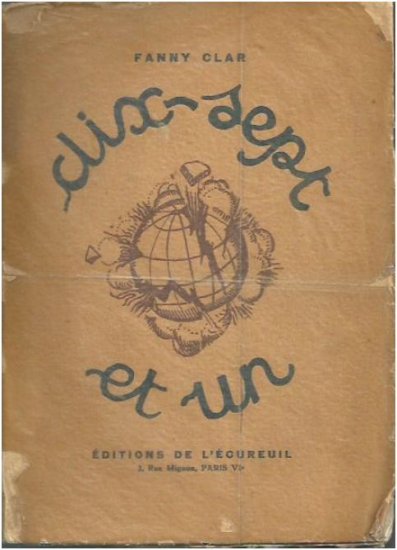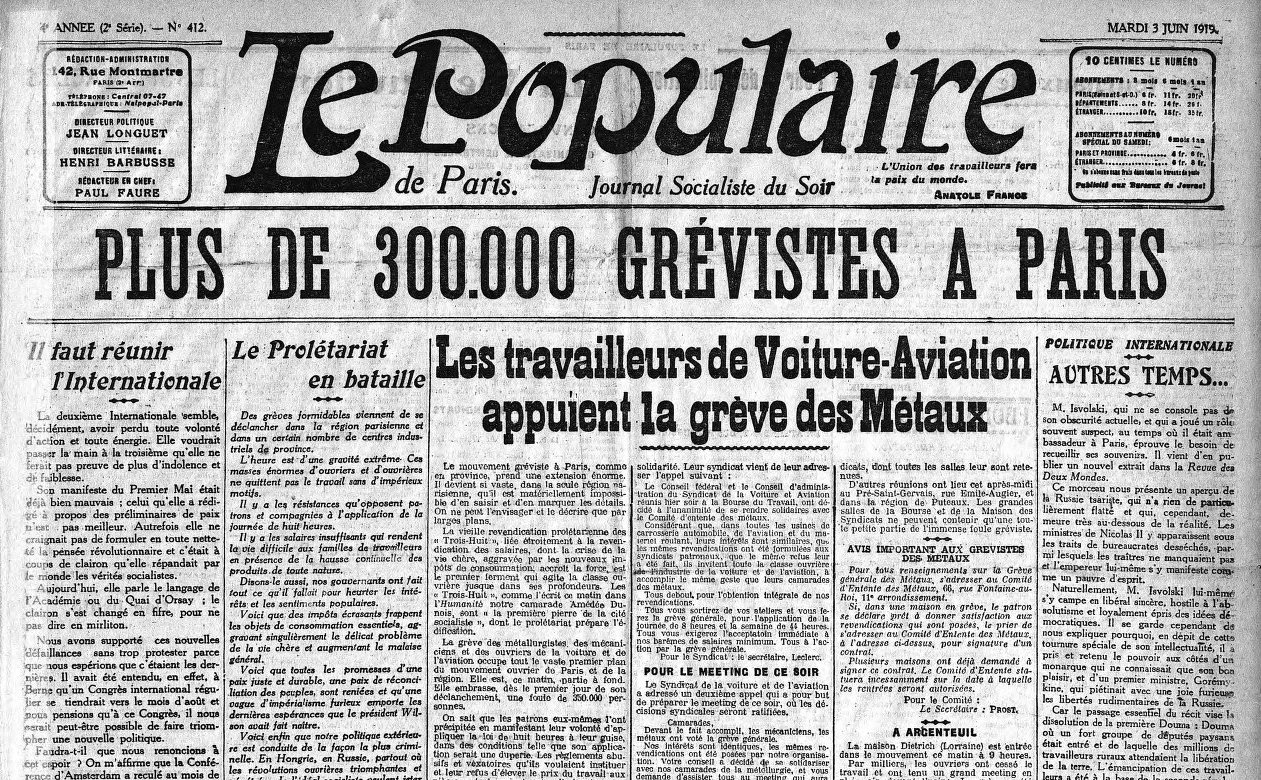|
Fanny Clar
Clara Fanny Olivier (February 17, 1875, 4th arrondissement of Paris – February 24, 1944), known by her pen name Fanny Clar, was a French journalist and writer, as well as a socialist intellectual (as defined by the French Section of the Workers' International (SFIO). She is also remembered for her commitment to pacifism and feminism. While her literary work includes novels, poems and plays, Clar primarily wrote stories for children. Early life Clara Fanny Olivier was born in Paris, February 17, 1875. She was the daughter of two opticians living on Avenue Victoria. Career In 1904, Clar contributed to ''Le Libertaire'' as "Francine". There she met Miguel Almereyda, the father of Jean Vigo, with whom she maintained contact. She participated in the (International League for the Rational Education of Childhood), founded by Francisco Ferrer in 1908. Beginning on August 21, 1912, and every week thereafter, in the antimilitarist newspaper she wrote a column for women titled "" (Our ... [...More Info...] [...Related Items...] OR: [Wikipedia] [Google] [Baidu] |
4th Arrondissement Of Paris
The 4th arrondissement of Paris (''IVe arrondissement'') is one of the twenty Arrondissements of Paris, arrondissements of Paris, the capital city of France. In spoken French, this arrondissement is referred to as ''quatrième''. Along with the 1st arrondissement of Paris, 1st, 2nd arrondissement of Paris, 2nd and 3rd arrondissement of Paris, 3rd arrondissements, it is in the first sector of Paris, which maintains a single local government rather than four separate ones. The arrondissement, also known as Hôtel-de-Ville, is situated on the Rive Droite, right bank of the River Seine. It contains the Renaissance-era Hôtel de Ville, Paris, Paris City Hall, rebuilt between 1874 and 1882. It also contains the Renaissance square of Place des Vosges, the overtly modern Centre Georges Pompidou, Pompidou Centre, and the lively southern part of the medieval district of Le Marais, which today is known for being the Gay village, gay district of Paris. (The quieter northern part of Le Marais ... [...More Info...] [...Related Items...] OR: [Wikipedia] [Google] [Baidu] |
Le Populaire (French Newspaper)
''Le Populaire'' was a socialist daily newspaper published in France. It was the main organ of the French Section of the Workers' International (SFIO) and, briefly, of the Socialist Party (PS). History and profile ''Le Populaire'' was founded in 1918.Martin, Marc. Médias et journalistes de la République'. Histoires, hommes, entreprises. Paris: Odile Jacob, 1997. p. 162 When SFIO split at the 1920 Tours Congress, the Communist took control of the main socialist daily ''L'Humanité'', while the Socialists retained control of ''Le Populaire'', which became the official SFIO publication. In 1927 the paper began to be published daily. ''Le Populaire'' was significantly weaker than its communist rival ''l'Humanité (; ) is a French daily newspaper. It was previously an organisation of the SFIO, ''de facto'', and thereafter of the French Communist Party (PCF), and maintains links to the party. Its slogan is "In an ideal world, would not exist." History ...''. Only during ... [...More Info...] [...Related Items...] OR: [Wikipedia] [Google] [Baidu] |
Vu (magazine)
''Vu'', stylized as ''VU'', was a weekly French pictorial magazine, created and directed by Lucien Vogel, which was published from 21 March 1928 to 29 May 1940; it ran for 638 issues. History ''Vu'' was the first large weekly to systematically feature photographs in essay form, and as such was an important precursor to, and proponent of, the magazine format of photojournalism (which came to prominence a decade after its print run in magazines such as ''Life'' and '' Look''). Innovation Although inspired in part by the German magazine ''Berliner Illustrirte Zeitung'', ''VU'' featured a constructivist aesthetic and was innovative in its layouts, especially in its double-page spreads, in which the layout artists were assisted by rotogravure from film positives of both type and halftone images which could be easily cut and arranged on a light box, rather than using less flexible and more expensive metal halftone blocks. Photography Notable contributing photographers includ ... [...More Info...] [...Related Items...] OR: [Wikipedia] [Google] [Baidu] |
Le Soir
''Le Soir'' (, ) is a French-language Belgian daily newspaper. Founded in 1887 by Émile Rossel, it was intended as a politically independent source of news. Together with '' La Libre Belgique'', it is one of the most popular Francophone newspapers in both Brussels and Wallonia, and since 2005 has been published in Berliner format. It is owned by Rossel & Cie, which also owns several Belgian news outlets, as well as the French paper '' La Voix du Nord''. History and profile ''Le Soir'' was founded as a free advertising newspaper in 1887. Later it became a paying paper. When Belgium was occupied during the Second World War, ''Le Soir'' continued to be published under German censorship, unlike many Belgian newspapers which went underground. The paper, which became known as "Le Soir Volé" (or "Stolen Le Soir"), was parodied by the resistance group, the '' Front de l'Indépendance'' which in 1943 published a satirical pro-Allied edition of the paper, dubbed the " Faux Soir" ... [...More Info...] [...Related Items...] OR: [Wikipedia] [Google] [Baidu] |
L'Obs
(), previously known as (2014–2024), (1964–2014), (1954–1964), (1953–1954), and (1950–1953), is a weekly French news magazine. Based in the 2nd arrondissement of Paris, ' is one of the three most prominent French news magazines alongside ''Le Point'' and ''L'Express''. Its current editor is Cécile Prieur. History and profile The magazine was established in 1950 as '. It became ' in 1953 and ' in 1954. The name ' was adopted in 1964. The 1964 incarnation of the magazine was founded by Jean Daniel and Claude Perdriel. Since 1964, ' has been published by Groupe Nouvel Observateur on a weekly basis and has covered political, business and economic news. It features extensive coverage of European, Middle Eastern and African political, commercial and cultural issues. Its strongest areas are political and literary matters, and it is noted for its in-depth treatment of the day's main issues. It has been described as "the French intellectuals' parish magazine", or more ... [...More Info...] [...Related Items...] OR: [Wikipedia] [Google] [Baidu] |
Société Des Gens De Lettres
The Société des gens de lettres de France (SGDLF; ; ) is a writers' association founded in 1838 by the notable French authors George Sand, Honoré de Balzac, Victor Hugo, and Alexandre Dumas. It is a private association recognised in France as an establishment in the public interest by decree of 10 December 1891. Members of the society must be writers whose work has been published by a publishing house (self-published works do not qualify). It is directed by a volunteer committee consisting of twenty-four writers, and is currently led by the novelist Alain Absire. Purpose It is the only writer-run writers' association in France with the expressed aim of defending the moral rights, the legal interests, and the social and legal status of all writers. It protects, considers, and proposes new rules and arrangements for the benefit of the community of writers. The SGDLF offers social and legal assistance to its members. It has facilities for the deposit of completed works, he ... [...More Info...] [...Related Items...] OR: [Wikipedia] [Google] [Baidu] |
La Mère éducatrice
LA most frequently refers to Los Angeles, the second most populous city in the United States of America. La, LA, or L.A. may also refer to: Arts and entertainment Music *La (musical note), or A, the sixth note *"L.A.", a song by Elliott Smith on ''Figure 8'' (album) * ''L.A.'' (EP), by Teddy Thompson *''L.A. (Light Album)'', a Beach Boys album * "L.A." (Neil Young song), 1973 *The La's, an English rock band *L.A. Reid, a prominent music producer *Yung L.A., a rapper *Lady A, an American country music trio * "L.A." (Amy Macdonald song), 2007 *"La", a song by Australian-Israeli singer-songwriter Old Man River *''La'', a Les Gordon album Other media * l(a, a poem by E. E. Cummings *La (Tarzan), fictional queen of the lost city of Opar (Tarzan) *''Lá'', later known as Lá Nua, an Irish language newspaper *La7, an Italian television channel *LucasArts, an American video game developer and publisher * Liber Annuus, academic journal Business, organizations, and government agenc ... [...More Info...] [...Related Items...] OR: [Wikipedia] [Google] [Baidu] |
Marceline Hecquet
Marceline Hecquet (?-1950) was a French feminist, anarchist and pacifist known for her activism for peace and conscientious objection after the First World War. She believed in the power of a pacifist, socialist and educational stance and argued during the interwar period that the main way to end war was through women education. Life Marceline Hecquet was born in France, but the exact details of her birth and early life are unknown. In the aftermath of the First World War, pacifism gained considerable traction as people sought to prevent the recurrence of such catastrophic conflicts. After the devastation of the First World War, she became deeply disillusioned with the destructive nature of war and dedicated herself to the cause of peace. Hecquet actively participated in peace rallies, conferences and other events to promote peace and disarmament. She worked with other pacifists and organisations to raise awareness of the consequences of war and to promote peaceful solutions. ... [...More Info...] [...Related Items...] OR: [Wikipedia] [Google] [Baidu] |
Madeleine Vernet
Madeleine Vernet (3 September 1878 – 5 October 1949) was a French teacher, writer, libertarian and pacifist. She attacked abuses in the state system of foster homes, where children were often used for their labor. In 1906 she founded ''l'Avenir social'', an orphanage for workers' children, which she ran despite government opposition until 1922, when she resigned after the board was taken over by Communists. She was a committed pacifist during World War I (1914–1918), and continued to be involved in pacifist organizations after the war. Life Pre-war Madeleine Eugénie Clémentine Victorine Cavelier was born on 3 September 1878 in Le Houlme, then in Seine-Inférieure. In 1888 her parents settled in Barentin, Seine-Inférieure, where they ran a small business. Around 1900 her mother, now widowed, moved to Pissy-Pôville, Seine-Inférieure, and took charge of four girls from the public assistance. This inspired Madeleine to write a series of articles on "''Bureautins''" in Charles ... [...More Info...] [...Related Items...] OR: [Wikipedia] [Google] [Baidu] |

